Episode 3
Sequins and Smiles
S02 - Episode 03
November 16, 2024
47 mins & 46 secs
Speakers
Chris McLaughlin
Soren Peterson
Dominick Varney
About
Dive into the vibrant world of drag as Maine’s local drag performer, Dominick Varney, shares personal stories and insights on embodying Queer Joy through the art of drag. This episode explores the power of performance art in challenging norms and celebrating identity, highlighting how drag can be a profound expression of self-love and community spirit.
#podcast #inspired #lgbtqpodcast #mentalhealthcare #lgbtqyouth #drag #theater
inspiredinsights@inspiredcg.com
https://rss.com/podcasts/inspiredinsights/
*Please note that this episode contains sensitive behavioral health topics such as suicide and substance use. If you are experiencing a behavioral health crisis, please contact the 988 Suicide & Crisis Lifeline by calling 988 or visiting www.988lifeline.org.
**This podcast is for information and entertainment purposes only and should not be considered health advice. This podcast is not intended to replace professional medical advice.
Transcript
Chris:
The Inspired Insights podcast is for informational and entertainment purposes only and should not be considered health advice. This podcast is not intended to replace professional medical advice.
Soren:
Please note that this podcast may contain discussions on sensitive topics such as mental illness, suicide, and substance use. If you are experiencing a behavior health crisis or need support, please contact the 988 Suicide and Crisis Lifeline by calling 988 or visiting www.988lifeline.org.
Soren:
Welcome back to this week’s episode of the Inspired Insights podcast with Soren Peterson, Chris McLaughlin. And today we have a lovely guest, a local celebrity, if you will. Would you like to introduce yourself?
Dominick:
Yeah, my name is Dominic Varney, and I’m an actor, director, choreographer in the area. Some of you might know me by my alter ego, which is Priscilla Poppycocks.
Chris:
Which I cannot wait to start talking more about.
Dominick:
Yes, me too. And I also work at the University of Maine. I’m a teacher and advisor up there, too.
Chris:
Dominic, thanks so much for coming.
Chris:
Hi, Soren, by the way.
Soren:
Hi.
Chris:
Thanks for starting the episode off.
Thanks for being here. I’m super excited to get into some conversations. For our listeners, in full transparency, Dominic and I have been friends for years now.
And this is an episode that I’ve really been excited and so appreciative of you kind of stepping through the friend boundary and coming into the podcast zone. So thank you for being here.
Dominick:
Thank you.
I feel honored.
Chris:
Thank you. Soren, how’s your week been, by the way?
Soren:
My week has been really swell. I’ve been, actually, my friends and I have been really getting into Magic the Gathering.
Chris:
I wondered if you were going to bring this in.
Soren:
Because it’s just so fun. And I think it’s really pleasant. And it’s reinvigorated my excitement for games and sort of like non-intellectual topics.
Right.
Chris:
Yeah.
Take a break.
Soren:
Yeah.
I spend all my time in the miasma of academia or books that I’m reading. And I think Magic with my friends is just a lovely break from that, where I get to take my head and breathe a little. Take my head above water.
Chris:
And how important that is.
Soren:
Yes.
Chris:
Which brings me to thinking about Inspired Insights for the week.
Do you want to go first? Do you want me to go first?
Soren:
Yeah, I can go first. Okay. So, my Inspired Insight of the week is inspired by the first few chapters of Crime and Punishment, which I just started reading.
And in that, I see the main character isolate more and more. And as he isolates, he grows a greater loathing for people as a whole. And it’s just sort of this positive feedback loop leading to ultimate isolation.
Right? And that’s also the case for positive emotions as well. And it shows me that although we have control over our emotions, our emotions so quickly build on themselves, spiral, and control us.
Right?
Chris:
Yeah.
Soren:
So, that’s my Inspired Insight of the week.
That’s a good one. Dominic, would you let me go?
Dominick:
Well, that just made me think about feelings. And I have a five-year-old named CJ. And we just read a story called The Boy with Big, Big Feelings.
Chris:
Oh. And I know that story.
Dominick:
Yeah, it’s beautiful.
And it’s a moment of reflection on him. Like, I want to make sure that I’m raising a child that is okay being emotional. Like, he’s an emotional child.
This Inspired Insight just made me think about all the days ago we had breakfast. And I’m not always an amazing parent. So, I gave him yogurt.
And I offered him what the other thing would be. And I said, would you like a waffle, pancake, a Pop-Tart? And he was like, I want a Pop-Tart.
And I was like, of course you do. So, he went off. And I went into the cupboard to get a Pop-Tart.
And we were out of Pop-Tarts. Yeah, I know.
Chris:
And so, all of our listeners just went
Dominick:
Oh, my heart dropped.
Chris:
Yeah, yeah, yeah.
Dominick:
Well, so did his.
Yeah.
So, he came around the corner. And I was like, hey, buddy, we don’t have any Pop-Tarts. And he’s like, oh.
And I was like, I’m going to make you a waffle. Is that okay? And he’s like, yeah, that’s okay.
And then, so I was making the waffle. And all of a sudden, I heard the piano in our other room start playing. And he was just playing the piano.
And I was like, oh, that’s really cute. And then, out of nowhere, I heard him singing. No Pop-Tarts for me today.
No Pop-Tarts at all. And it was, like, perfect. I was like, oh, I’m so sorry you don’t have a Pop-Tart.
But I was like, we wouldn’t have had this moment if I had a Pop-Tart. So, he’s like his own Billy Joel moment.
Chris:
Yeah. Has that been something that you have worked with CJ on to, like, direct towards music? Or just did that on his own?
Dominick:
No, we just did it on his own.
Chris:
That is so, so cool. So, my inspired insight is going to keep this feelings trend going.
So, thanks for kicking that off, Soren. Yeah, Derek and I went and saw a show at Penobscot Theatre last night, their first show of this new season, which Inspired Consulting Group is a sponsor of, goes Penobscot Theatre. Thank you for allowing me to sponsor your season.
And so, we went to the first show, which was a play called Birthday Candles. And it probably is one of the most beautiful stories I’ve ever seen play out on a stage. And the fact that this is happening in Bangor, Maine, just blew me away.
I went through all the feelings. It was like 90-ish minutes of every single feeling. And I’m going to call my husband out a little bit.
When we left the theatre, you know, that silence of people kind of processing kind of a heavy-ish performance. And Derek was just like, I didn’t even realize I was crying. And I’m crying.
And I was like, oh, I realized I was crying. Like, all of the feelings. But it’s just, for me, so here’s where the insight comes in, right?
The importance of supporting the arts and the importance of supporting local theatre, especially when it’s this good, supporting it. And the importance of these public displays of emotion that just model for the rest of the world, as you’re doing with CJ, that it is absolutely not just okay, but essential. Totally.
That we experience the full range of all the emotions that as humans we’re able to experience.
Soren:
Yeah. What I see in both of you guys’ inspired insight is that arts’ primary utility is to be as an incarnation of emotions. It is a raw expression of an emotional sensation and can lead to an outlet and an expression of, within other people, those emotions.
Chris:
Yeah.
Soren:
And I know that you, Dominic, are a performer. And I was wondering how drag and just you have used theatre in general as an outlet and expression for your emotions, or how you’ve used it to develop your own emotional state, right?
Chris:
Great question.
Dominick:
Yeah.
I always look at my life in thirds, which is weird. I’ve always believed that in order for my emotions to be neutral, that there were three things that needed to be in balance. And so one was that I knew that I wanted to be teaching.
I wanted to be inspiring and changing the world in a classroom setting. And that’s something professionally that I do and that I went to school for. And then there was a part of my being that needed to be fulfilled at the theatre level.
I needed to be performing and writing and artistically doing something and then balancing that out with my own personal family. And I always found that the family being the center of it, that if one of those other things was off, then the family was off. So if I was completely immersed in work, teaching, and I didn’t have an artistic balance there, that my family could tell that something was off.
And vice versa, if I was only doing theatre and not really focusing on the teaching, then my family felt that too. So that’s how I maintain my life, which is exhausting. But during COVID, that was really tricky because both of the things that I do to balance my life were really non-existent.
That’s really kind of where my drag journey started was during COVID.
Chris:
Well, let’s just get right into it. Tell us a little bit about her.
Tell us about Priscilla.
Dominick:
Priscilla is full of sass with a little bit of class. Yeah, I was looking for a way to connect during COVID, being at home.
And I work with the Penobscot Theatre. That’s not a secret. And the director at the time was looking for something that would connect the community.
And so I said, why don’t we do like a talk show on Zoom? And I was going to do it as Dominic. And I don’t know, somewhere along the line, I did a video playing Frankenfurter during COVID and people really enjoyed it.
So I was like, why don’t I do it in drag? And she was like, OK. So I just started this talk show called Dishin’ in Drag, where I talk to people all over the community about theatre and arts.
And about five or six episodes in, I just had the feeling that I need to name her. I need to name this persona. And so there’s a history around Priscilla Poppycocks.
Chris:
So as somebody who watched all of your videos, what was also really fun is you would make cocktails. And you would invite your viewers to make those cocktails and sort of have this dynamic of having a little happy hour together and just kind of dishin’ in drag. Yeah, it was super fun.
I’ve told you this before, Mission Accomplished, with that whole piece around connecting and community, it brought so much joy to so many people, not just in this area, but all over.
Soren:
Yeah, I know that my experiences being in quite a rural area, I haven’t had a lot of queer influences outside of the internet, right? And in freshman year, I went to go see your Christmas Priscilla Poppycocks show, and I found it really inspiring. I really, really liked it, because it was the first time I had seen a queer performance in a public forum in my entire life, right?
And there’s something so empowering and liberating about that, about seeing that as a queer youth, right? And it’s so powerful to have queer representation in a public forum.
Chris:
And you named it. You and I have talked about this before, Soren. I think in Season 1, where we have talked about the importance of representation, especially in media, and how different that was for our different age groups growing up in the 80s and not having—let me rephrase that.
The only queer representation I saw growing up was the AIDS patient or the sex worker or the victim of crime. And so how different that is, and I remember talking with you, Soren, and your mom after that performance. The glow on you talking about that performance is—it’s an incredible thing.
Dominick:
For the long time, when I first started doing it, I almost had an imposter syndrome about it, because it was something that I created out of need for the community and myself. It was a little selfish, because I was missing that part of my balance. And then once COVID ended and it started to become real, where people were asking me to come in and talk to them and perform, I felt like an imposter, and sometimes I still do.
Because I’m an actor, and so Priscilla is a part of me, but she’s also a character that I play. But all characters, as an actor, when you’re portraying a character, the goal is to make them real. The goal is to make them believable.
Relatable. Relatable. And so it seems strange that Priscilla is an extension of me, because the character wouldn’t be believable to anybody if she wasn’t.
Chris:
You’re bringing up something that I think is so important for our listeners who may not know a whole lot about drag or drag culture. This idea that this persona is a part of you. It’s bigger than just slapping on a wig and makeup, right?
That you are giving a piece of yourself through Priscilla. And I’m curious, Dominic, are there times where that boundary gets even more blurry for you between Dominic, the dad, the husband, the teacher, the professional, and Priscilla, who’s zany? Priscilla’s big.
When Priscilla walks into a space that you are performing in, Priscilla owns that space the minute that first high heel touches the floor. And Dominic doesn’t walk into spaces like that when Dominic’s Dominic.
Dominick:
Yeah, I don’t know.
People always say Dominic is so funny or big and loud, and I’m always like, I’m really not. Because people know me from the stage. I usually play those characters, and I always feel that I’ve let people down sometimes when I’m just Dominic.
Because they’re expecting something more. And like you said, Priscilla is big and loud. And I don’t think there’s ever been a moment where I was concerned about the cross.
Because like I said, Priscilla still talks about her child as my child. She talks about her husband as my husband. So I don’t try to fool anybody.
No one thinks I’m a woman, which is what I want.
That’s the whole artistic part of it.
Chris:
And that’s so important as well, that there’s an element of Priscilla that’s a character. But it’s not that Priscilla has this completely fictional backstory.
Priscilla’s you, right? And so a lot of your performances over the last couple years as Priscilla have been sort of your story told as Priscilla. And there’s nothing fictional about that.
And so I think that’s also really important for folks to recognize is that at least your drag, it’s still Dominic. Dominic’s still in there. You haven’t created this completely made up story.
Like Priscilla just didn’t drop from a stork in the sky, right? Priscilla is you and you are Priscilla. I find that to be equal parts fascinating and it’s lovely.
Soren:
Yeah.
I mean, one of the things I have done all of the performances that my local high school has put on, and I wouldn’t say that I’m a fantastic performer by any means, but I think that getting into character, in my experience, is both an exercise in external empathy, discovering what it’s like to be someone else. But also, mainly, it is discovering a different aspect of you and then embracing it in order to become that performer. Yeah.
Right. I think like all of us have pretty much every part of human nature within us somewhere. And when you’re on stage, you just pick one of those things and embrace it.
Right.
Chris:
What’s the favorite character you’ve ever played, Soren? Who’s that been?
Soren:
I think the most fun I’ve had playing a character was probably when I was playing a moon, the moon, rather, in Adam’s Family, which is not a large role by any means. But I just got to be, just like drag, actually, I got to be a very out there diva and feel the show without saying a single line. Right.
So I had to be very expressive and I had the long white gloves. Yeah. And I thought that it was really fun.
Chris:
Yeah. Yeah. I love it.
Soren:
And it is just like drag, that character, actually. Yeah. Because it is very much not me.
Yeah. But also, at the same time, I get to feel, I got to feel powerful in a very effeminate character, which isn’t typical of effeminacy. Right.
Chris:
Yeah.
Dominick:
Priscilla’s mooned a lot of people as well.
Chris:
Yeah. The moon dashed the moon out. Yeah.
Soren, I think that’s so cool. That’s amazing. Yeah.
Dominick:
Was it scary?
Soren:
No. I don’t know.
I’ve never really had stage fright. I think the one time that I had stage fright, I broke out in Hives, the first show I ever did, because I was in sixth grade. And I had, I think, the third largest role in the show for the middle school thing.
And I had to do a Scottish accent, like a Shrek accent. And I forgot a few of my lines, and I was just tearing up backstage.
Chris:
Really?
Soren:
Yeah.
Chris:
And you rebounded, and like you said, you’ve done theater every year through your school.
Soren:
Yeah.
At this point, I think it’s not so much about the performance, but it’s mainly because I’ve gotten myself into a community, and I like the culture of it. And I think theater, a lot of the benefit of it is the community aspect.
Dominick:
It’s like a family.
Soren:
Yeah.It is like a family.
Chris:
Yeah. I’m curious, so I don’t even know if you, you might know this about each other. Soren, you go to high school in the same high school that Dominic graduated from.
That’s true. And so, you know, thinking about, because you did theater in high school as well, Dominic, didn’t you?
Dominick:
I did one thing.
Chris:
Okay. Yeah.
Soren:
Only one show in high school?
Dominick:
Wow. Yeah, I didn’t come into acting until really in college.
I sang. I sang in high school. I did show choir, and I did chorus, and those things.
But I didn’t actually, like, take the stage for real, I would say for real, like I wanted to do it, and it was fun, until college. That’s interesting. In high school, I did one show.
They did Once Upon a Mattress.
Soren:
That’s the show that we’re doing right now.
Chris:
No way.
Dominick:
Oh, that’s great. Are you in it?
Soren:
Yeah.
Dominick:
Do you know what part you are?
Soren:
Yeah, I’m King Sextimus.
No lines again.
Dominick:
Again, a scene stealer, so I feel like you’re being a little typecast. I think that’s… The King is hilarious.
Chris:
I think it’s wild that your first show happens to be the show you’re in right now.
Soren:
Yeah?
That is kind of crazy. I didn’t even know that Once Upon a Mattress was a show back in the day.
Chris:
I was like, careful.
I thought that it came out recently.
Soren:
That’s better. Sorry, sorry. That’s better.
Dominick:
Well, it did get revived. It’s revived right now on Broadway.
Chris:
Oh, really?
Dominick:
It is with Sutton.
Chris:
Do you remember who you played in that?
Dominick:
I played the minstrel, which was really just a singing role, so that’s kind of how that landed.
Chris:
It was in your comfort zone background. You know, for folks out there who have seen some of your performances around your holiday special and the other one-woman show as Priscilla, you talk a lot in that show, in those shows, about your high school experience and sort of how you discovered your queerness. I’m wondering if you, as Priscilla, think back about high school Dominic and what might have been different if there was a little bit more Priscilla that you brought with you through that high school career.
Dominick:
That’s a great question.
I look back at my high school and being closeted and being scared and really trying to convince myself that I could change. I think that I put most of my energy in that. Not that I knew I could change.
It’s very fascinating. I don’t know how I would have done it differently at that time, back in the olden days. I’m not sure how I would have done it differently.
I surrounded myself with people that liked me, that I had fun with, that I’m still friends with. I felt safe with them and I was safe with my family. Because that’s the reality.
The more you hide, the more people see it. That’s right. I think I just avoided people as much as I could until I left that space.
But it’s so beautiful looking at the way high schools are right now. There are so many wonderful clubs and students that are being proactive and loud and proud. If I could be in that world now as a high school student, I know I would be different.
Chris:
Yeah, I feel the same.
Dominick:
It just goes to show how much has changed and how much progress has been made because of people like you. I’m so grateful.
My son will be so grateful.
Chris:
Yeah, and we’ve talked about this a lot over a couple seasons now. For me, I very intentionally did not do theater. Out of a fear, a stereotype, a stigma that if I did theater, that would have been really too gay.
And it would have shone a light that I wasn’t willing, able, ready to have.
Dominick:
Which is fascinating, right?
Because if you look at the movies of our generation, all of the famous actors and stars who were making so much money and that everybody loves are all straight men. But we were afraid to act in high school because we might be thought of as gay.
Chris:
That’s right. The stereotype that I had is, well, gay kids would do theater, so I don’t want to be that gay kid, so I’m not doing theater.
Soren:
And, I mean, this is one of the examples where stereotypes are right.
Dominick:
They’re based on truth.
Chris:
A lot of gay kids do theater.
Yeah, it is. It’s fascinating.
Dominick:
Well, I think that comes down to the feeling that you have about the family, the community.
You feel safe with these people. And not that you don’t feel safe in a sports team, but there is a different energy of emotional, absolute awareness.
Soren:
I think, especially for queer men, still there is, in at least my experience, I don’t feel safe on a sports team. And obviously things are changing and will continue to change. But I would agree.
Theater does provide that sports-like environment where you have a community, you’re working towards something together. There’s a team element. There is a team element.
Chris:
My avoidance of theater doesn’t mean that I was hanging out on the football team or the basketball team. I was in the band. That felt middle ground.
Because at my high school, there were some theater kids in the band and there were some athlete kids in the band. And my high school, which was Old Town, we’ve talked about this. At Old Town High School, during those years, the band was widely, it was good.
We were a good band. Tell me more. I was first chair trumpet for several years.
Oh, wow. It helps that my stepfather was my music teacher all through elementary school. But that band’s room, that was one of my safe spaces.
Dominick:
Yeah, same for me for the chorus.
Chris:
Yeah. And so I think some of the parallels here is that representation matters, right?
If I had seen more out, proud, queer actors, maybe I could have claimed some of those other spaces as well. So representation matters and community matters. And that sense of safety and family matters.
And whether it’s band, whether it’s chorus, whether it’s the arts, or whether it’s the locker room after practice, right? Like wherever a young person is accepted and validated and safe.
Got to promote more of that. We’ve got to create more of those spaces.
Dominick:
I definitely Chose to sing Because it allowed me I said it in my show They’re like I was able to they’d leave me alone if he could sing I could sing pretty good I was I was great.
So they would leave me alone. Yes. I had this talent that yeah that they didn’t have.
Chris:
Yeah Yeah, yeah, and that’s I guess that’s another really important point too is whether you can hit a hockey puck Really well or shoot a three-point really well play trumpet act sing really well There’s a bubble of some kind of safety because it’s a distraction totally.
It’s a distraction
Soren:
Yeah,I think that talents put power into the hands of people who can’t stand on their own in some contexts, right Or at least provide like social immunity as you were saying
Chris:
You and I have talked a lot about How the idea of clicks have changed a lot of yeah years and so in your With your peer group now your friends Magic is cool.
Like playing the card game magic is cool.
Yeah You had a group of friends that you did magic tricks together we would absolutely do a live I would love to see that.
Soren:
I Don’t know if that would be cool. I
Chris:
Do love a good magic show But this idea of talent right this idea and then this idea of clicks and so what we Dominic and I May have perceived as not really a cool crowd Now kind of is the cool crowd and those social walls have kind of been
torn down a bit
Soren:
High school because It was all like one community and there wasn’t the internet to create like we she ate communities had one hierarchy, right and coolness was judged by Everybody and you cared about what everybody thinks. Yeah, where is now in high school? I Don’t think most people care about what anybody outside of their immediate friend group thinks And I think that’s really great because it allows kids to be far more expressive and feel far more comfortable being themselves in an environment where they are around a lot of peers that once they Would be scrutinized by but now don’t really care right?
Chris:
I can’t even imagine a Chris in high school Who didn’t care what every other person was thinking about Chris? Yeah, that is such a foreign Concept to me. What do you think sort is behind that?
Like what do you think has created that shift over the years Isaac caught a difference in confidence?
Soren:
No, I think it’s the internet Yeah, not a necessarily a difference in confidence I actually I think kids are probably have lower self-esteem than they did because now the High school is still a war zone. But the Attackers aren’t those around you they’re that which resides within you. Yeah, right But I think that through the internet people have been exposed to a wide variety of Experiences and individuals outside of their high school environment
Chris:
I’d love to hear what you think about this Dominic because you are also in the classroom now You know different age groups, but you’re in the classroom and yet we know That rates of anxiety are higher than they’ve ever been before among young people Depression higher than they’ve ever been before and so while 30 or so years ago. I Was living in a inside of this head that was doing all kinds of like Not always very successful things.
I don’t remember My peers At this high level of distress That we’ve talked about going on with your peer soren at times, you know, and so well,
Dominick:
I think that’s because
well, my theory is it’s because they are those people were allowed to show those emotions and those high heightened areas of their Psyche because it’s acceptable for for it was it was acceptable for those I’m saying like heterosexual or conceived heterosexuals in high school in our time They were had permission to act how they wanted right? They were able to act on their emotions their their Attractions, you know, they were able to act on their aggression aggressive feelings and and people would Not shun them or me on it, right, but people in our community Didn’t
Chris:
That’s right
Dominick:
They weren’t allowed to yeah, and if for fear of being weak for fear of being Feminine if there if it’s a male for fear of of being ridiculed for more than just a minute It’s now gonna be for the next four years, right? So I Don’t I don’t think we were given permission to do this, right? But I think that you are I think that the youth today and are able to do that.
Soren:
Yeah Yeah, and like I was saying and looping back to the importance of representation Representation is permission. Yeah examples of other people engaging in things and it being socially accepted is Society permitting an activity. That’s right, right and Like I I think drag queens and the Female trans community at least in the very beginning were sort of the first Head like they were at the head of the queer liberation movement.
Chris:
Oh, right hundred percent.
Soren:
Um, and I I think this is perhaps means speculating but I think that the additional power that Being someone that is still you but a little bit different than you and more powerful and more Dominant than you and yet a feminine being a drag queen Allows you to more confidently advocate for yourself and those around you. Yeah, right.
Yeah, and Do you feel like that’s allowed you to more effectively advocate and made you feel more powerful in public settings?
Dominick:
Um as Dominic or Priscilla as both actually well I think like when I do a gig as Priscilla if there’s like a Person that I’m that’s that I’m not enjoying for whatever reason She will put her and put the person in its place and you know, I have a problem with it Yeah, I don’t know what Dominic would do in a performance setting Like that I think that You speak representation. I think that being a husband and having a child in today’s world has made Dominic more aggressive and assertive. Mm-hmm, because I’m and And and open because I want my son to see me be a Yeah, sort of and confident and open.
Yeah so I’m trying to think of a situation that it did but I do feel like Dominic speaks up more Yeah, and I think it’s because of that.
Chris:
Yeah
Dominick:
I don’t know if I just I’m I’m pretty I’m boring I don’t like I’m not aggressive in in a lot of things but Priscilla is
Chris:
Well, I think that speaks a little bit to Soren’s point and I’d love to get your perspective on this Dominic around this this notion of drag as power and and drag as a as a art form about reclaiming that power and about as somebody who Is has never? publicly done drag I like Every drag Person I know That word power is almost always referenced in use and I’d love to hear from you about what that power has Looked like and was it was it day one? Was it Priscilla day one or Priscilla day hundred and one that you felt that power?
Dominick:
I think for me and Priscilla I Knew that I was a different drag queen. I knew from the very beginning that I wasn’t I Wasn’t I wanted to show people that a drag queen doesn’t have to be someone who is Half naked and is wearing as lip-syncing and and death drop death dropping. Yeah, um, not that that’s bad I think that they can do people that can do that are amazing.
I knew that I wasn’t gonna be that person Yeah, because I wanted It’s that representation thing, but it’s not just so that my community can see it But it’s so that other people can see that that a drag queen isn’t just that right Yeah that a drag queen can just be funny and comedic and heartfelt. Yeah, and And an entertainer I like to think of like I always people say like who do you who do you feel like you are the most like as Priscilla and I always say those it’s like a combination of Like Julia Child’s, yep Julia Child’s and like Dame Edna like like they Not that Julia Child’s was a drag queen. Yeah Dame Edna was just an entertainer and was funny and made commentary on life and people loved her and And people weren’t afraid of her.
Yeah, and That’s kind of what I went into Priscilla being like I don’t want people to be afraid of Priscilla I want people to go up to her and Say hi and enjoy her and
Chris:
yeah
Dominick:
No, yeah, I don’t want to yeah does that make sense at
Chris:
100% yeah and this permission to laugh Yeah, because I think my experience going to drag shows yours as well as others all over the country that There’s a piece of queer joy there that I that we also talk about it’s it’s it’s actually becoming one of my more prominent mantras in my own personal and in the professional work I do that we talk I talk so much about depression and anxiety and the really important stuff and So it’s sort of that parenting adage, right and and teaching adage for everyone negative Make sure you have this many positive. And so I’m really trying to integrate that that for every harsh reality I also want to make sure we’re giving three plus examples of Queer joy and why joy is such an important essential life-saving element of our resilience And so you give as Priscilla people permission to laugh and put their stuff aside for a couple hours and Laugh at you and then laughing with you and at you.
They’re also laughing at themselves Yeah, and and laughing at the perspective of for that couple hour show What was going on for me before I walked through that door is taking a backseat. Yeah, and it’s permission It’s a permission to laugh at and with because you absolutely Create a space where you want people to laugh at you as much as they’re laughing with you.
Dominick:
Yeah, and I’m okay with that Yeah.
Chris:
Yeah. Yeah, it’s it’s so it’s a it’s a it’s magic. I like but Now I’m talking more about the trick right?
It’s absolutely It’s pure magic. It’s pure joy Every time I’ve walked out of a Priscilla event whether it’s a bingo brunch a trivia night or a Heartfelt show where you’re just putting it all out there Every time I’ve left I’ve left feeling joy That that’s I might not have had coming in or been aware of
Dominick:
And sometimes a winner
Chris:
And sometimes I left a winner
Soren:
Yeah, bingo, yeah, yeah, I think the performances both as performers and As people watching them it is both escapism and Allowing you to augment what is outside of that escape, right? Like I know that performances Especially freshman year doing drama was kind of my only Requiem I don’t know if I’m using that word, right?
From My extremely negative emotional state, right?
Chris:
Are you saying it was a break?
Soren:
Yeah
Chris:
But it allowed you to take a break, right? Yeah, like a like take a break from the heavy you were able to put aside the heavy head stuff just for a little bit and Be someone else.
Yeah something else Yeah, so true, yeah, I you know, I Love it, and I I know that we sadly live in a world today Where there is so much. I Hate I don’t know even know what other word to use for it coming out at all of us in all of the Identities that we have and so as we kind of start thinking about wrapping up today Dominic I’d love to just hear from you. What do you want?
listeners to know about Drag what do you want them to take away from this new podcast? Maybe it’s something that you hadn’t thought of before
Dominick:
Well, I think like I speak a lot about living in living for drag and I want people to understand that that drag isn’t necessarily a Man and woman’s clothing or a woman in men’s clothing, but there’s drag in everyone and it just looks different It’s that confidence to do something that you don’t think you can do is you’re in your normal skin and so, you know drag can be Political it can be emotional it can be performance.
It can be theater I like to think of it like people who say that they’re an athlete or they’re athletic and that is a range, right? You can be How are you athletic you can be a d1 athlete? You could be a professional football player or you could be the person that walks their dog every Sunday To briskly.
Yep. Yeah, so being an athlete can be different no matter what and so drag is different for everyone and it’s different for every Individual, but it’s also different for every drag queen. Yeah And there are lots in this community that are doing really wonderful events and nights and representation and I Just want people to enjoy themselves when they see a drag queen Because they’re really just there for joy for joy
Chris:
Yeah, I Love that.
I love that There’s one other thing. I’m going to ask you to do at the end of a lot of almost all of your shows you have a saying that you offer your audiences and I’d love for you to share that saying and maybe let us know what that has meant.
That saying has meant for you
Dominick:
Yeah, I think Growing up I’ve always been a person that wants to help others and that others usually come before us and I think that’s part of our Community. Mm-hmm I think that people in our Community really just want other people to be happy and then they also think about them Other people more than I think about themselves or maybe it’s just that I’m a Pisces. Yeah, not what I But um, there was a just a moment when I created Priscilla that I realized I’d given so much to other people That I realized I hadn’t saved a lot for myself.
Mm-hmm. And so I just started saying Save a little love for yourself. Don’t you dare give it all away?
Mm-hmm Because there’s got to be a piece that keeps your light burning. Mm-hmm There’s got
to be a piece that keeps you the inspiration team going on for another day. Mm-hmm Yeah
Chris:
Thank you for that.
Soren:
Thank you so much.
Dominick:
Thank you. This has been lovely.
Chris:
Ah So thank you to our listeners for tuning in today this I’m just like I have I’m processing so much It’s probably a little leftover birthday candles performance last night, but I thank you Dominic so much I want to encourage our listeners to follow Some of your advice and and make sure that they are doing a little something extra for themselves in the coming days and We don’t ever give our listeners homework and I feel like I have homework I want to give our lifts their listeners about Making sure that they’re filling their own cup and keeping a little bit in their cup that Filling it doesn’t mean you fill it so you can empty it all out and then start with an empty cup again. So Keep a little bit of that self-love in that cup and To find what gives you power find what makes you Joyful find what makes you Confident and do a whole lot more of that as well Yeah any last words Soren
Soren:
To what makes you you you’ll never Face backlash from someone that is deserving of making commentary for being yourself.
Yeah and I think that drag shows that I think that this show has showed that and I am just so excited to see how queer media progresses as I get older and my Generation steps on to the stage even more and we’ve learned so much from All of the older queer members of the community
Chris:
Senior the senior member.
Soren:
Oh, I’m sorry. I’m sorry.
I really I’m dragging you guys I think you look great.
Dominick:
I think you look great.
Chris:
Well, thank you all. This has been another episode of the inspired insights podcast I am Chris McLaughlin.
Soren:
I’m Soren Peterson.
Chris:
Thank you, Dominic Varney and until next time. Take care.
Soren:
Have a lovely rest of your week
The inspired insights podcast has been brought to you by inspired consulting group LLC edited and produced by Amanda Seidel and Derek Carter marketing support for the inspired insights podcast by Elizabeth Keenan music by Derek Carter, please visit www.inspiredcg.com to learn more copyright 2024 all rights reserved You
Show More
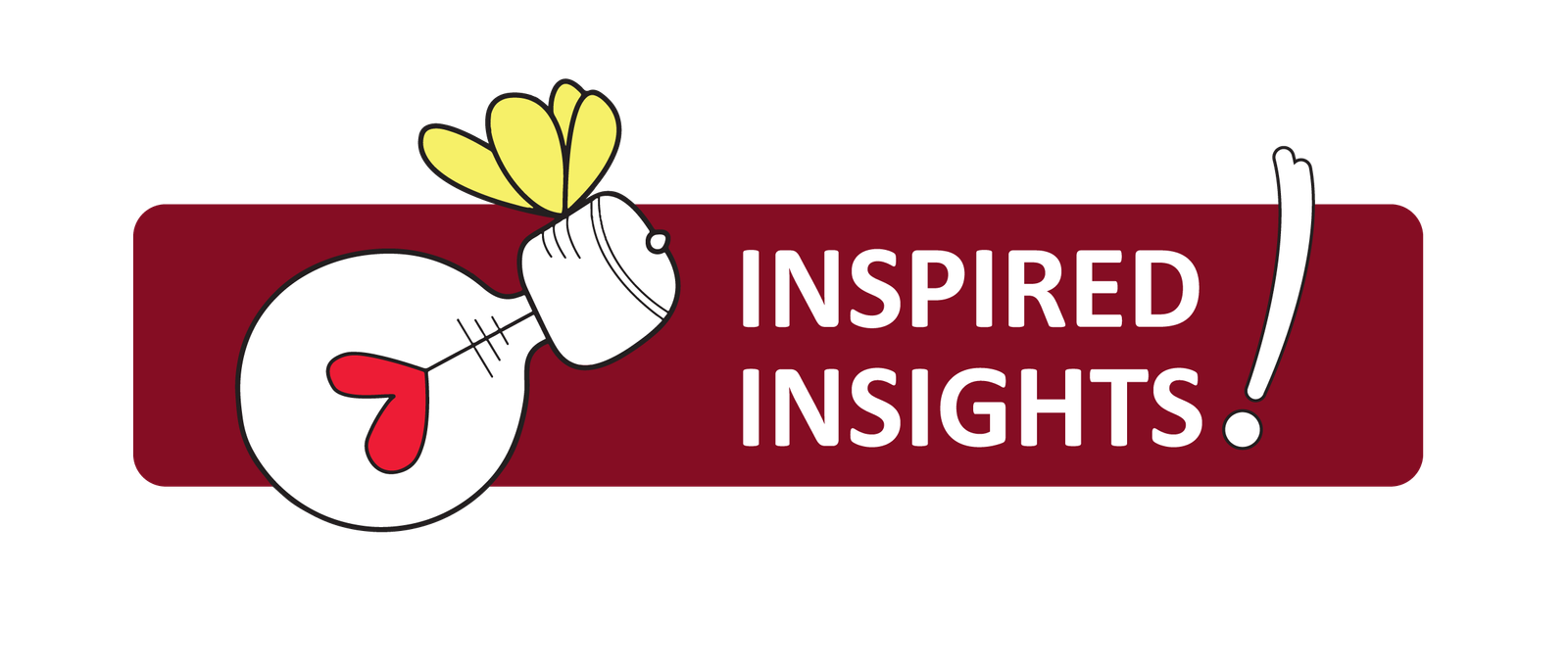
All Episodes
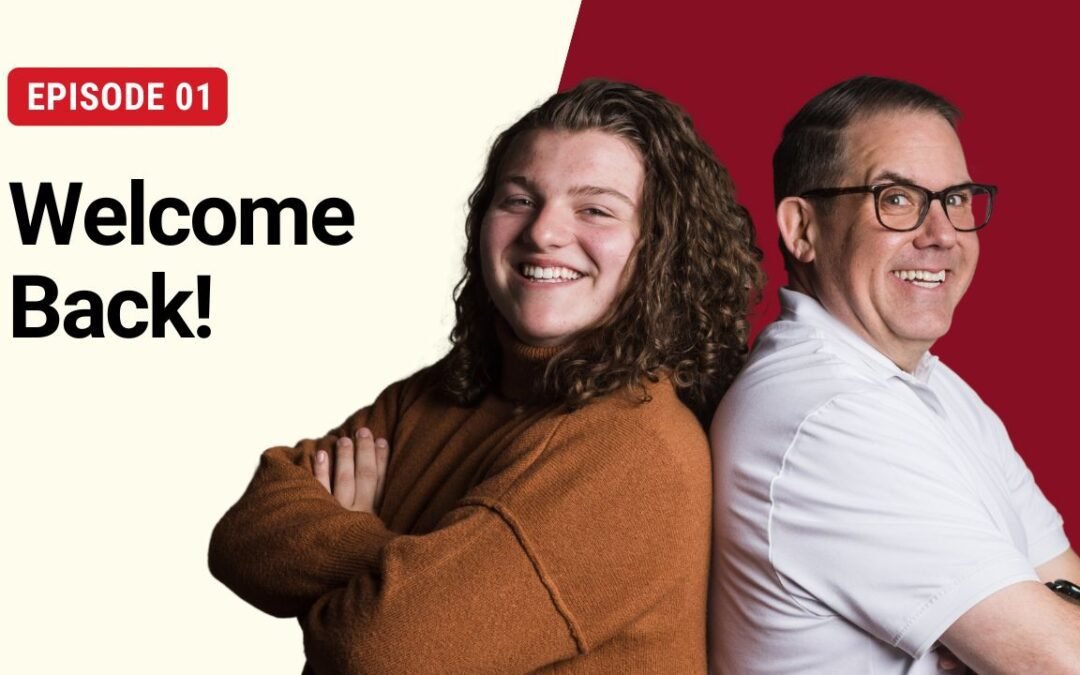
S3E1: Welcome Back
Welcome back to the Inspired Insights Podcast for the very first episode of Season Three! Join hosts Chris and Soren as they dive into a heartfelt conversation about the evolving world around us–and within us.
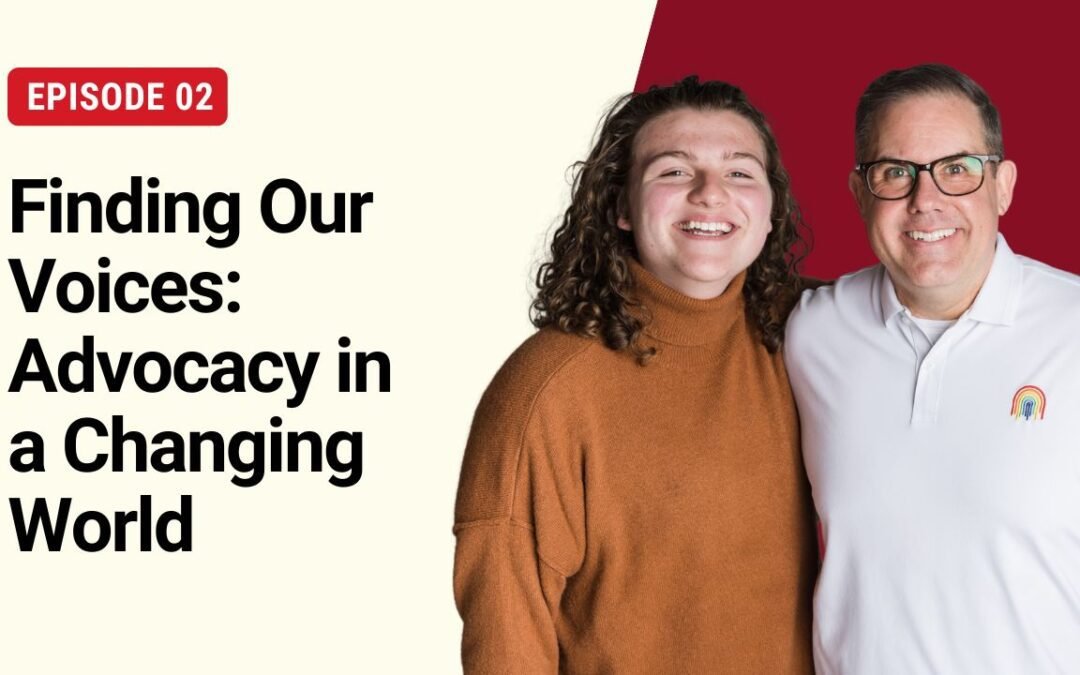
S3E2: Finding Our Voices: Advocacy in a Changing World
Chris and Soren sit down with seasoned lobbyist and tireless human rights advocate, Charlotte Warren, to explore the power—and the personal cost—of advocacy in today’s shifting political landscape.
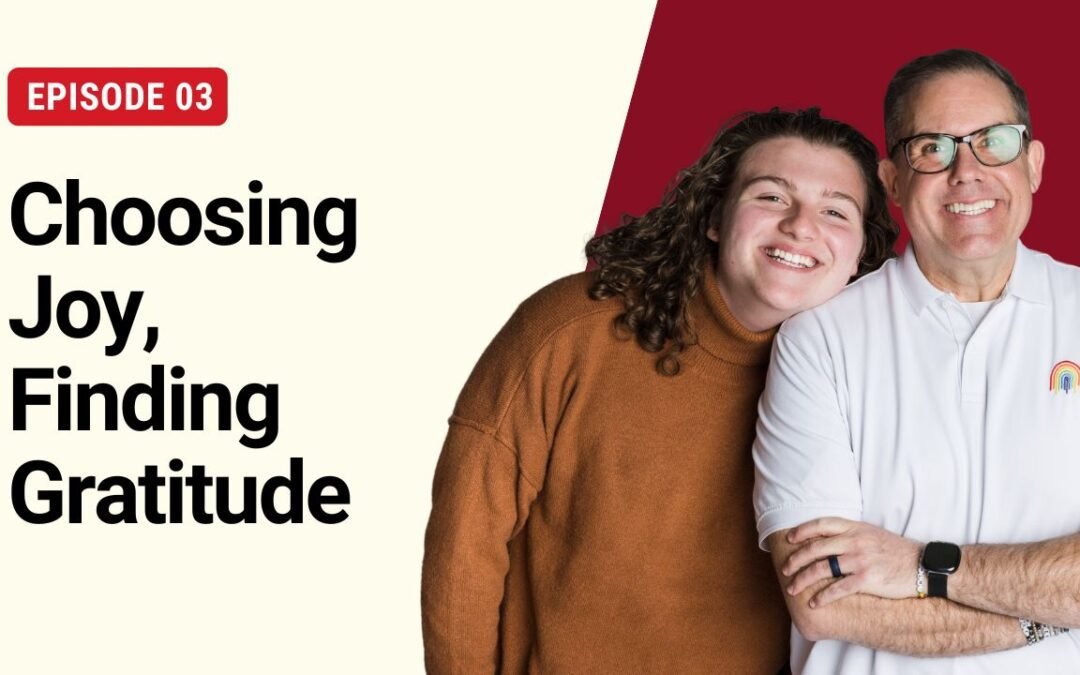
S3E3: Choosing Joy, Finding Gratitude
Chris and Soren unpack how reframing our thoughts can change the way we experience the world—from the inside out.

S3E4: The Power of Storytelling
Chris and Soren sit down with Authenticity Coach and Author Suzanne Carver to explore how sharing your story—and embracing who you truly are—can open doors to healing and transformation.
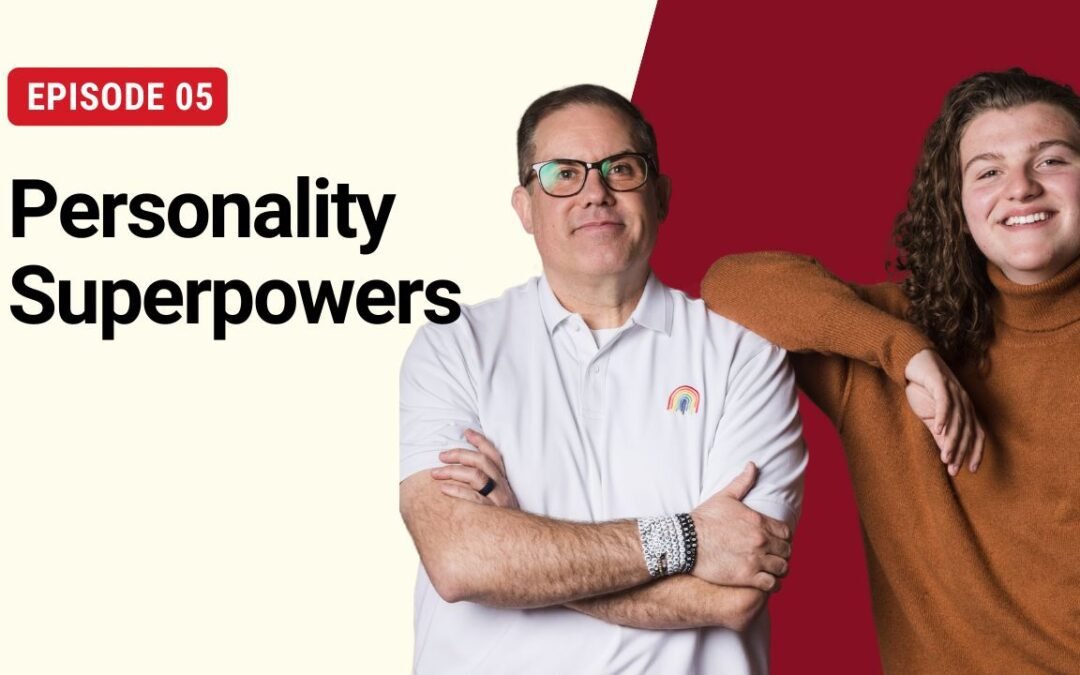
S3E5: Personality Superpowers
In this episode, Soren and Chris explore their Myers-Briggs personality types and how trauma and lived experience have influenced how they show up in the world.

S3E6: The Power of Pride
Together, they explore the deeper meaning behind Pride celebrations—why they matter, how they foster connection and visibility, and what it really takes to bring a community-wide event like this to life.
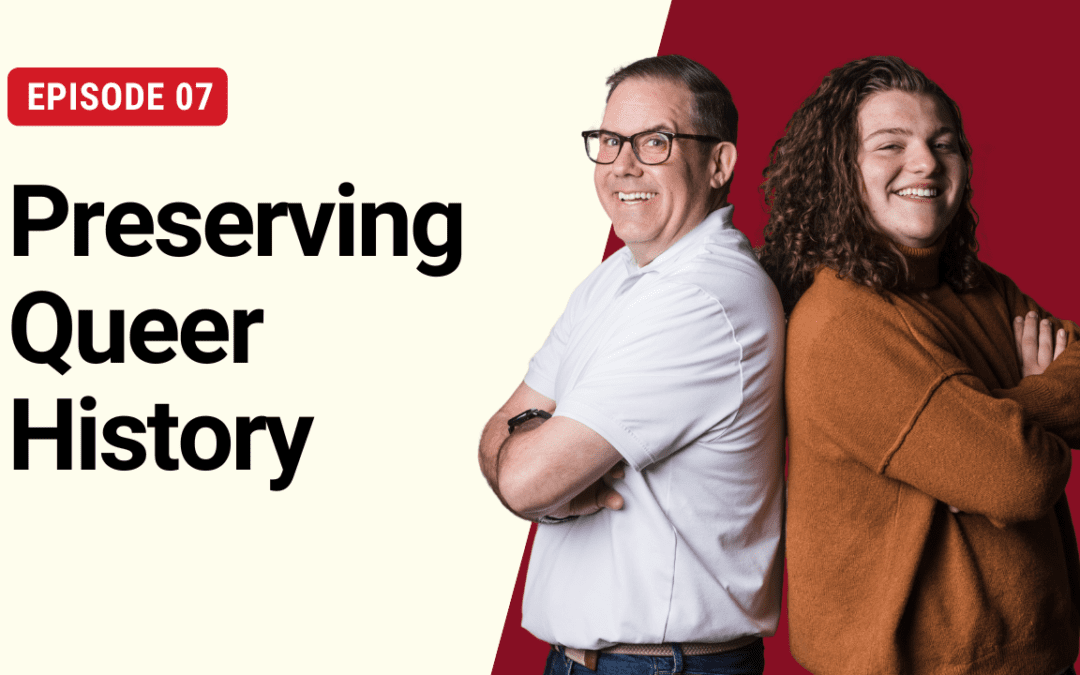
S3E7: Preserving Queer History
Soren and Chris sit down with special guests Sam and Emma to explore the vital importance of preserving queer history through storytelling and community memory.
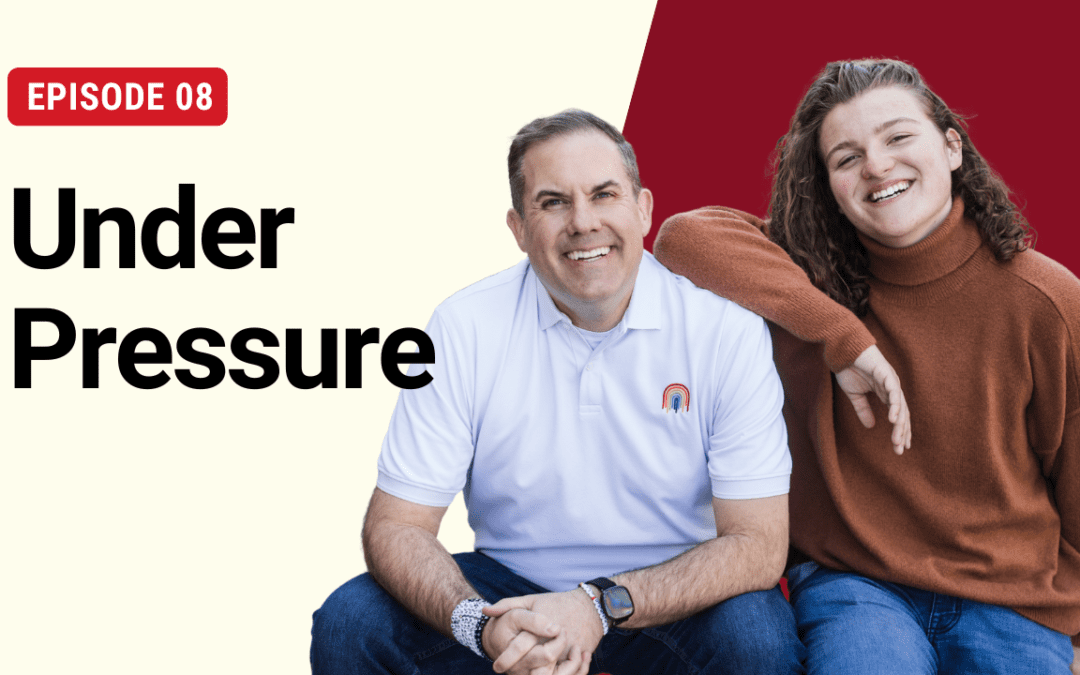
S3E8: Under Pressure
What happens when we let teens speak for themselves? In this candid and eye-opening episode, Soren and Chris hand the mic to two remarkable young adults—Sophie and Bennet
